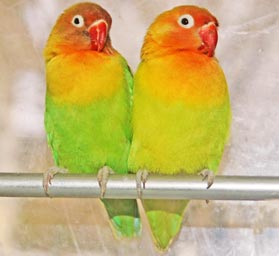
Before you teach your pet any tricks, the first step is to gain its trust and to tame it. This includes curbing any habits like biting.
Biting is a natural instinct. Don’t hit or yell at a bird for something that it was born to do. Instead, firmly say “No biting!” whenever it nips your finger. If a week of reprimands doesn’t work, just place your thumb and index finger by its beak and very gently squeeze it. (Other owners will shake whatever the bird happens to be standing on, since it will automatically stop them from biting—they’ll be too busy trying to recover its balance!)
love birds Training-Teaching Tricks
Love birds are very smart birds, with the IQ of a four year old. They can be trained to perform many cute tricks, like “Hokey Pokey” (waving their foot) or playing fetch. They can also drop things into containers or hop from one foot to another.
It is easier to teach love birds tricks than to teach it words. They are not the most prolific talkers—definitely not as “verbose” as the African Gray—but they can learn a few phrases, especially with patient training. They will also mimic sounds and may surprise you by imitating music or even the calls of other birds.
love birds Training-Best candidates for training
It is easier to tame hand fed birds, since they are used to human contact. Also play with your pet as much as possible, so you gain its trust, and it actually looks forward to your “quality time” together.
Try to schedule your training session at a set time each day. Choose a quiet place with very little distractions—no television, no radio. Shut any doors, closets and windows. These birds are smart but have a very short attention span.
Once you’ve set up your training area, take your bird out of its cage. Use a very soothing, low voice, showering it with compliments like “Good girl” or “Pretty bird.” Initiate the trick only when it is relaxed.
Remember, be patient. Yelling is counter productive. You will only scare your bird and it will do its best to get away from you—and may even resist the next time you try to take it out of its cage. When it is successfully performed a trick, give it a treat right away so that it associates an action with a reward.
You should do training sessions every day so that the bird doesn’t “forget” what it is learned.